Partager l'article ! Aux frontières du non dit et de l'indicible du 21e siècle Un problème juridico historique: ...

Le Tambour d'après le roman de Gunther Grass (prix Nobel) inaugure une série de malaises
suivi par Le soldat Perdu (The Lost Soldier) dont je retiens les images un peuen vrac, quitte à revenir sur ma recherche "brute".
 On ne peut plus rien dire
On ne peut plus rien dire
Si tu veux pas te retrouver seul t'as intérêt de fermer ta gueule
On ne peut plus rien dire {x2}
Sûr qu'on est d'accord avec toi
Mais c'est pas nous qu'on fait la loi
On ne peut plus rien dire (Didier Bourdon des Inconnus)

Review:
Based on the autobiography by Rudi Van Dantzig, "For A Lost Soldier" takes place during the end of WW II in the Netherlands. It's the story of a young boy in Amsterdam whose
parents send him to live in the country (Friesland) for his own safety. A family who had initially asked for a young girl ends up being young Jeroen's "adoptive" family. Jeroen is coming of age,
being the tender age of 12, and is making discoveries on his own, especially his sexuality. He doesn't necessarily understand his feelings at first, until the arrival of the Canadian Liberators
in 1945.
One particular soldier, Walt Cook, takes an interest in young Jeroen and a friendship blossoms between the two. Heit, Jeroen's adoptive father, sees that there is more to their friendship than
meets the eye, and lets him know that he sees what's going on. This doesn't bother the other soldiers, however. In fact, as other soldiers are courting young girls in the village, so does Walt
"court" young Jeroen. The two fall in love with each other, and a sexual relationship does indeed develop.
Perhaps it's Walt not wanting to face the hurt Jeroen will eventually face, but he fails to tell Jeroen that his platoon will be leaving. Jeroen is crushed when he realizes that Walt is gone the
next day, and tries in vain as he searches the village for him.
For a Lost Soldier: An Interview with Roeland Kerbosch
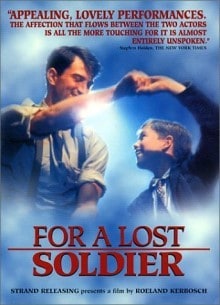 In January 2012, the world lost Rudi van Dantzig – an acclaimed choreographer and writer. For twenty years, Dantzig
served as Artistic Director of the Dutch National Ballet. Ted Brandsen, the current director of the institution, described Rudi as ”inspiring, passionate, intense and true to himself ” [2].
In January 2012, the world lost Rudi van Dantzig – an acclaimed choreographer and writer. For twenty years, Dantzig
served as Artistic Director of the Dutch National Ballet. Ted Brandsen, the current director of the institution, described Rudi as ”inspiring, passionate, intense and true to himself ” [2].
In 1986, Dantzig published an autobiographical novel titled Voor een Verloren Soldaat (For a Lost Soldier) in which he recalls his youthful affair with a Canadian soldier when the Netherlands was liberated at the end of WWII. The first person narrative of the rite of passage experiences of Jaroen, the young protagonist of the film, is one of the most powerful and sincere accounts of growing up ever written. It consequently won numerous awards – despite the highly controversial theme of the book. It was translated into English and adapted for the big screen in 1992 by the Dutch director Roeland Kerbosch. The film, undoubtedly of the Coming-of-Age genre (though the first person narrative is lost in the transfer to screen), had a nationwide American theatrical release and consequently was distributed on VHS, DVD and, most recently, via on-demand streaming on both Netflix and Amazon.
The majority of the reviews, on the film’s IMDb page and on Amazon.com, are positive – as evidenced by the ratings on the sites: 4.3 out of 5 stars on Amazon, 7.6 out of 10 stars on IMDb (rating figures are as of 03.05.2012). One of the reasons for such high ratings may be read about in Stephen Holden’s review published in The New York Times. He writes: “One of the strengths of the film is its refusal to load the story with contemporary psychological and social baggage… the film assigns no blame and assesses no damages” [3]. The powerful story by van Dantzig, an author who “…. felt acutely the intolerance of the times” and made it “… a major theme in his ballets and writings” [1]. For a Lost Soldier became one of the most controversial Coming-of-Age films ever released.
Twenty years after the date that the film was first screened, TheSkyKid.com contacted the film’s director, Roeland Kerbosch, for an exclusive interview. In the interview that follows, TheSkyKid’s questions will be represented by “SK” and Mr. Kerbosch’s answers will follow with the designation “RK“.
![]()
The Interview
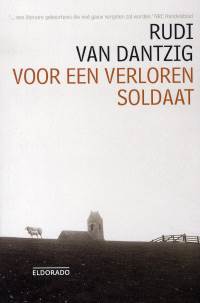 SK: The movie
For a Lost Soldier is based on the autobiographical novel with the same name, written by Rudi van Dantzig. He passed away few months ago. How well did you know him?
SK: The movie
For a Lost Soldier is based on the autobiographical novel with the same name, written by Rudi van Dantzig. He passed away few months ago. How well did you know him?
RK: Although it was difficult to get to know the real Rudi van Dantzig, I think I knew him quite well.
SK: Recently I talked with a friend, who mentioned that some years ago he had a conversation with Rudi van Dantzig in which he mentioned that he wanted to make a sequel to his story as it appears in For a Lost Soldier? Are you aware of that idea and if such a sequel were written would you have been interested in doing a sequel to the movie as well?
RK: The idea for a sequel must have been a misunderstanding. Rudi wanted to write a novel on the same subject but from the point of view of the soldier.
SK: When one sees the film for the very first time, the mis en scene in the small Frisian village where the action takes place makes quite an impression. One of the reasons for the popularity of the book in the Netherlands is the fact that many of the readers went through the experience of being sent away during the “hunger years“ of WWII. In fact, I read somewhere that you were also sent to Frisia as a kid. How has your personal experiences contributed to the adaptation from the book to the large screen?
RK: The novel was successful in The Netherlands; the film was not. Only a very few readers could have had the same experience as Rudi and myself during the so-called hunger winter in 1944-1945. Mostly just kids from Amsterdam were sent to Friesland and, because of lack of transport, only a few could escape the lack of food in Amsterdam. Rudi and myself we were lucky. I fully adapted my own experiences in Rudi’s story. It became a mixture of his and my story. The relationship with Walt was Rudi’s sexual experience, not mine as I was only four at the time. The atmosphere of the film and the visual impression is my personal memory, added to the novel.
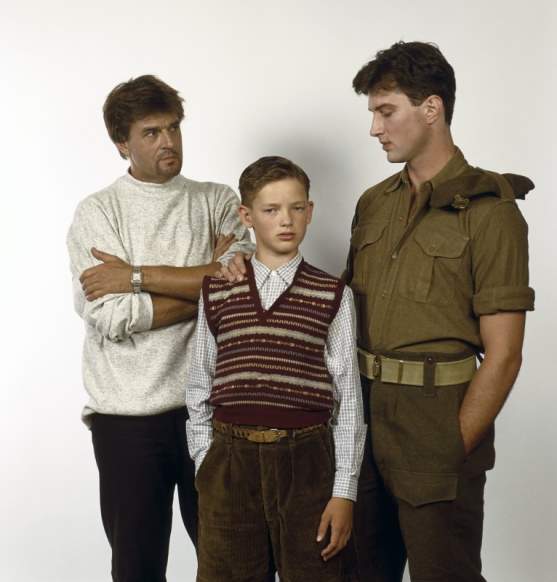
NLD-19929691-HILVERSUM: Actors Jeroen Krabbe, Wouter Smit (m) and Andrew Kelly in For a Lost Soldier ‘. COPYRIGHT KIPPA
Image source : http://www.anp-archief.nl/page/95573/nl
SK : The talent of an actor, combined with the direction of the production, is what makes a character memorable to moviegoers. The role of Jaroen requires a great deal of talent from the young actor, mainly because of the wide range of emotions he is expected to portray on screen. Maarten Smit did a marvelous job, but because of his age and the controversial subject matter of the film our readers would be interested in the casting process for the role. What made Maaren Smit stand out from among the other candidates for the role and do you have any memories from your work with him while filming the movie?
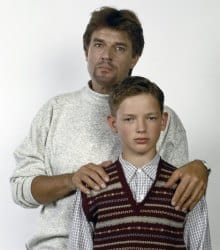 RK: Maarten Smit (Jeroen) indeed did a marvelous job. At the casting sessions, he was self confident and
intelligent, not at all behaving as a kid actor who wants to do this role; that’s why I choose him. I could easily communicate with him. He read the novel, didn’t think much of it. He
understood it very well though, the implications of the story, and what his performance should look like. And that’s what he did: a professional.
RK: Maarten Smit (Jeroen) indeed did a marvelous job. At the casting sessions, he was self confident and
intelligent, not at all behaving as a kid actor who wants to do this role; that’s why I choose him. I could easily communicate with him. He read the novel, didn’t think much of it. He
understood it very well though, the implications of the story, and what his performance should look like. And that’s what he did: a professional.
When For A Lost Soldier had its successful release in the USA, he was approached through me by Disney Studios. He turned down the invitation to come to Los Angeles for an audition. That was typical Maarten Smit: the job was done, get on to something else; not acting.
NLD-19929691-HILVERSUM: Actors Jeroen Krabbe and Wouter Smit en in de Nederlandse speelfilm ‘ Voor een verloren Soldaat ‘. COPYRIGHT KIPPA
SK: Having mentioned Maarten Smit, we must also ask you about the casting of the other protagonist of the film, Andrew Kelley, in the role of the young Canadian soldier Walt. Was he really a dancer at the Royal Dutch Ballet and did this play any role in the casting process?
RK: I knew Andrew Kelley as a dancer at HNB (Dutch National Ballet). It was his features, his introverted character and, moreover, his vulnerability that convinced me. As a dancer, he had tremendous discipline and, of course, some acting experience. He was extremely insecure during the difficult scenes with Jeroen. But Jeroen helped him quite a lot on the set to get through it.
SK: Are there certain things you think that you could have done differently if you made the movie today?
RK: If I would do this movie again, I would ask for much more money for the dancing scenes. The way these scenes were written originally in the screenplay would have given a lot more production value to the film.

SK: For a Lost Soldier is a film with sensitive subject matter and, even to this day, many people consider it one of the most controversial films ever released. Yet the sensual way in which the story is portrayed has resulted in many people liking the film, as evidenced from its high ratings on IMDB, Amazon.com…etc. By now, one can safely say that the film has become a classic as people recognize the value of the story and learn to reach their own conclusions to the many questions that the movie raises. That’s nowadays – but what was the public reaction like when the film first came out? How was your film received in other countries? Was the film ever banned or not respected in some parts of the world?
RK: Rudi van Dantzig himself made no secret of the fact that he was never a very good dancer. As choreographer and director of HNB (Dutch National Ballet), he inspired many dancers, composers, painters, and filmmakers like myself. His influence went much further than ballet. My personal tribute to Rudi was the movie For A Lost Soldier.
SK: Let’s finish the interview with a question I always ask filmmakers. As theSkyKid.com mainly focuses on Coming-of-Age films, it would be interesting to know if you have a favorite Coming-of-Age film that you could recommend to the people reading this interview.
RK: While not really a true Coming- of- Age film in the strictest sense, I’d recommend the French film Etre et Avoir . It is “between the lines”.
![]()
I would like to dedicate this interview to the memory of Rudi van Dantzig.
In Memoriam Rudi van Dantzig 1933-2012
The story of a romantic relationship between a grown-up and a child. Set in the Netherlands near the end of WWII.I will be the first to admit that the subject matter is a bit risqué for the typical American movie goer. However, keep in mind that this is told exclusively from the viewpoint of the child. It is also done in a realistic and yet romantic way. The child is obviously longing for comfort and security, having been removed from the security of his family during WWII. In addition to being placed into a foster home, a pubescent Jeroen finds himself realizing his budding sexuality is that of one who is attracted to the same sex, which also adds to the feelings of loneliness and isolation. This film deals with a difficult topic, but does it in a way that simply tells a story with enormous feeling and sophistication.
Voor een verloren soldaat (For A Lost Soldier)
Director: Roeland Kerbosch
Cast: Maarten Smit (Jeroen), Andrew Kelley (Walt), Jeroen Krabbé
Netherlands | 1992 | 92 min
For a Lost Soldier 1992, originally Voor Een Verloren Soldaat


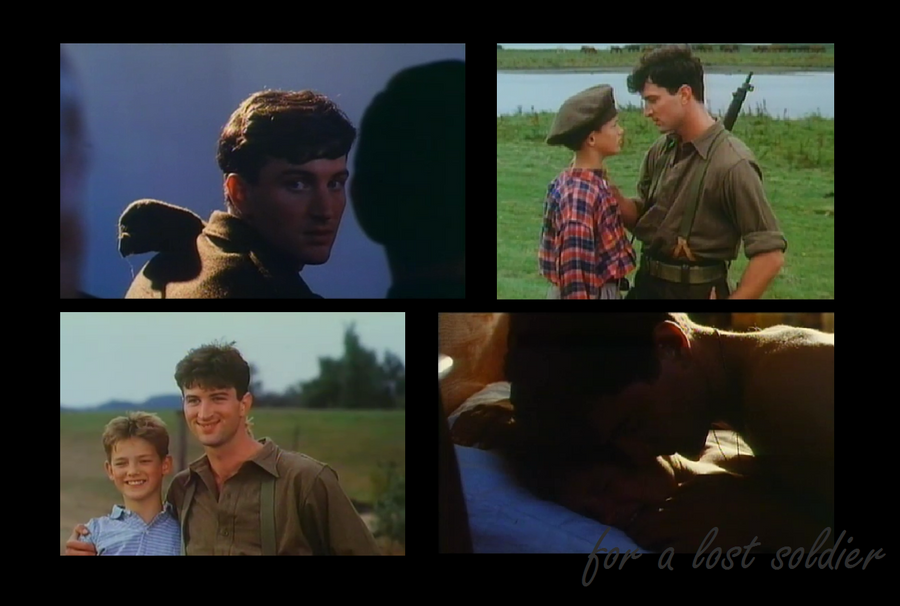







Ecrire un commentaire - Voir les 0 commentaires
Commentaires
Aucun commentaire pour cet article
Liste d'articles
- il y a des dimensions optimum du pénis. Un gars avec une petite queue -Francois- m'a fait passer une nuit torride et inoubliable...alors, les très grosses queues...???
- vous serez plus déçu de regarder sous la culotte des filles où vous ne verrez rien sinon une, des pacholes point barre alors que sous les calbuts des mecs toute une diversité de bites et couille
- je réfléchis à ce que tu m'as dit .. 1 au nom de la liberté 2 y avait pas à le questionner 3 au pire ne pas écouter son délire et 4 passer votre chemin Laissez-les vivre ! les mecs handi'
- leurs bites pointent obstinément vers le centre de la terre où ils iront bientôt ; ça explique leur nostalgique passion envers les jeunes bites qui pointent, elles, vers le ciel ! -lol-
- VOCABLES : ["RIEN A CARRER"]quand on est VULGAIRE ou DELICIEUX, au choix parce qu'on ne sait pas (ou plus) ce qu'on dit!
- Attali, le 'Prophète' se défausse quelquefois : «prendre le risque d'être un jour accusé de vouloir ce qu'en fait on craint et qu'on ne décrit que pour le combattre»
- la France des grandes villes contre nous, la France rurale et des villes petites ou moyennes; à Cavaillon par exemple MACRON CASSE LA FRANCE EN DEUX .Nostalgie de la manif pour tous ?
- PUTAIN ! pourquoi j'ai jamais été comme ça ?
- dansez sur moi ...quand je n'y serai plus
- Suivant que vous serez puissant ou misérable... vous aurez oui ou non un gigolo Ramonez-moi au pays des merveilles... partenaire
Présentation
- : Le blog gay de Cavaillon et ses amis prostitués
-

- : Gay
- : BLOG ICONOCLASTE ET GENERALISTE Ca ne suffit pas d'afficher des bites et des baises ce blog est gay sasufipaléfotoPORNO_ifo pensé1p Tu vas dire :" claudio tu copies beaucoup". Oui mais en fait je ne mets que de l'intéressant GAY&BI&NOLIMITS ça vous empêche pas de chercher pr votre compte !
- Partager ce blog
- Retour à la page d'accueil
- Contact
Catégories
- LOIS SUR SEXUALITE -MAJORITE-PROSTIT.-DELITS . (175)
- FICTION & SCIENCE FICTION REVER PARODIES (183)
- CONNAISONS NOS FRERES (736)
- ELOGE DU BAREBACK A BAS LES TABOUS & NOKAPOTE (531)
- LISEZ VISIONNEZ VIDEOS & RECITS FICTIONS FANTASMES (226)
- SUR LE VIF - CONTEURS- RECITS-REPORTAGES (672)
- ESCORTS-PROSTITUES-ACTEURS X pour le fric (239)
- VIVRE SA SEXUALITE, SES FANTASMES (687)
- CULTURE GAY & SOCIETES (497)
- ELLES ET NOUS & VIDEOS (194)
- EUX ET NOUS HETEROS ET GAYS (159)
- FOUS RIRES DECONNE (HUMOUR, FUN) (771)
- AMOURS & VIE DU BLOG (170)
- 1er&2e DEPUCELAGE->HOMO UN JOUR HOMO TOUJOURS (187)
- MASTURBATION MASSAGE & SPORTS EN CHAMBRE (77)
- PSYCHOLOGIES &VIE SOCIALE gay-bi-hét (237)
- RELAIS - ZAPPINGS- PARTAGES photo expo (474)
- DECOMPLEXER les BISEXUELS -&- PERES LIBERTINS (218)
- PISS-TRASH- .LAVEMENT-CURIOSITE (104)
- CHRO-NIQUES & INVITES (GAYS BI HET... ETC) I (151)
- MEDITATION & REFLEXIONS "Tempus Fugit" (251)
- HYPNOSE, MYSTERE, ESOTERISME SENSUALITE (145)
- CONDUITES DITES DEVIANTES"INAPROPRIEES", PERVERSES (215)
- RECONNAISSANCE(S) &TRANSMISSION DE MESSAGES PRIVES (122)
- TABOUS & MYSTERES -ANGOISSES, (86)
- AMOURS REVEES-REGRETS-NOSTALGIES (132)
- L'ART DE /erotic music ciné danse peintur litter.. (209)
- LUTTES HISTOIRE & REVOLTES DES GAYS (154)
- LA CHANCE AUX CHANSONS PROMO PASCAL SEVRAN (226)
- FAC FAC FAC= FUCK FUCK FUCK=AMOUR "U" (60)
- TRANS - ET- CHANGER DE GENRE (22)
Profil
Texte Libre
Articles récents
- ENFIN LA VIDEO J'ai changé de fournisseur d'accès et ça me réconcilie avec erog
- ouahhhhhhh !un parcours sup' (super je v dire) en ma compagnie.Regardons ensemble ces liens indélébiles de baises nokapotes !
- SOCIOLOGIE PD - Socialiser les gays sauvages ah ! ce sont les premiers et les pires des DISCRIMINATEURS
- plutôt que de perdre mon temps sur les réseaux je me décide à aller là où les mecs savent ce qu'ils veulent et me dirige vers notre drague, aujourd'hui petite,amputée par l'homophobie municipal
- LA CULOMANCIE une science qui prend sa source dans notre diversité. Montre-moi ton anus et je te dirai qui tu es
- Gode ceinture double Ceinture élastique Sextoys "Le texte de votre avis contient des termes inappropriés."Ben fallait pas me demander !!!
- les bonnes heures ! La poutre apparente des jeunes lutteurs à la fin du combat
- je me suis laissé aller sur grindr puisqu'il paraît qu'aujourd'hui notre vie sociale se consacre et se concrétise sur les réseaux dits...sociaux
- le top15 des applis de rencontre
- Mon premier fisting de fisteur...Dans un squat assez glauque...je serrai tous les doigts d'une même main pour former une tête de serpent
Communautés
Archives
- janvier 2020 (1)
- octobre 2019 (4)
- septembre 2019 (9)
- août 2019 (18)
- juillet 2019 (26)
- juin 2019 (36)
- mai 2019 (48)
- avril 2019 (44)
- mars 2019 (37)
- février 2019 (29)
- janvier 2019 (30)
- décembre 2018 (46)
- novembre 2018 (43)
- octobre 2018 (46)
- septembre 2018 (64)
- août 2018 (40)
- juillet 2018 (53)
- juin 2018 (65)
- mai 2018 (87)
- avril 2018 (98)
- mars 2018 (46)
- février 2018 (78)
- janvier 2018 (102)
- décembre 2017 (60)
- novembre 2017 (83)
- octobre 2017 (79)
- septembre 2017 (76)
- août 2017 (89)
- juillet 2017 (102)
- juin 2017 (99)
- mai 2017 (117)
- avril 2017 (94)
- mars 2017 (107)
- février 2017 (95)
- janvier 2017 (128)
- décembre 2016 (125)
- novembre 2016 (94)
- octobre 2016 (150)
- septembre 2016 (123)
- août 2016 (129)
- juillet 2016 (173)
- juin 2016 (170)
- mai 2016 (194)
- avril 2016 (131)
- mars 2016 (169)
- février 2016 (146)
- janvier 2016 (179)
- décembre 2015 (186)
- novembre 2015 (168)
- octobre 2015 (138)
- septembre 2015 (177)
- août 2015 (135)
- juillet 2015 (170)
- juin 2015 (150)
- mai 2015 (161)
- avril 2015 (143)
- mars 2015 (156)
- février 2015 (119)
- janvier 2015 (168)
- décembre 2014 (167)
- novembre 2014 (130)
- octobre 2014 (122)
- septembre 2014 (113)
- août 2014 (122)
- juillet 2014 (123)
- juin 2014 (101)
- mai 2014 (86)
- avril 2014 (76)
- mars 2014 (59)
- février 2014 (85)
- janvier 2014 (80)
- décembre 2013 (86)
- novembre 2013 (83)
- octobre 2013 (96)
- septembre 2013 (133)
- août 2013 (89)
- juillet 2013 (63)
- juin 2013 (71)
- mai 2013 (86)
- avril 2013 (152)
- mars 2013 (191)
- février 2013 (104)
- janvier 2013 (92)
- décembre 2012 (43)
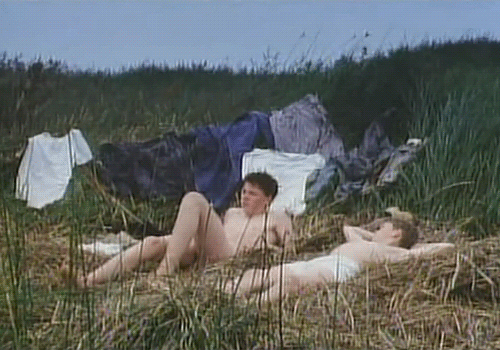

































Derniers Commentaires